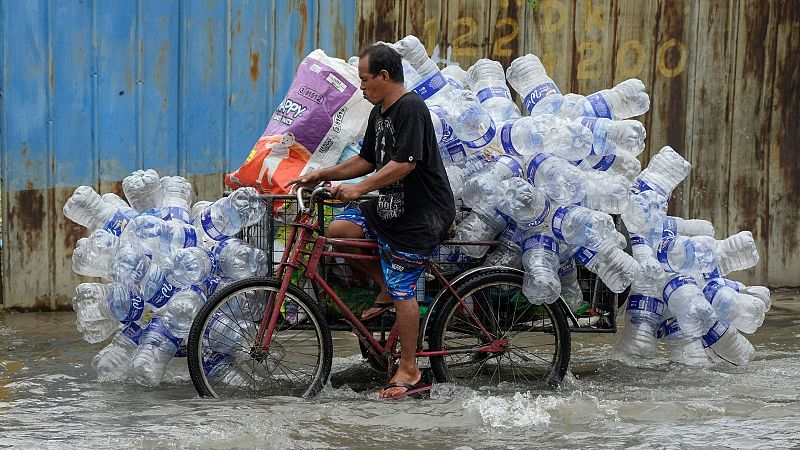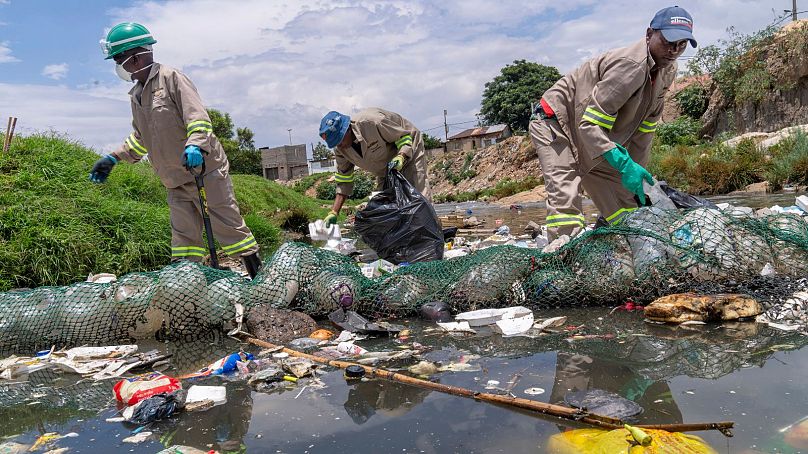Global plastics treaty talks resume in Geneva: Is this the ‘world’s last chance’ to act?

Talks to secure a Global Plastics Treaty are restarting in Geneva on Tuesday (5 August), with negotiators striving to break a deadlock that prevented a deal last year.
Over the next fortnight, national delegations need to reach a unilateral consensus on many critical issues in order to create a legally binding international agreement on plastic pollution.
The second part of the fifth session of the Intergovernmental Negotiating Committee (INC-5.2) follows the collapse of talks in Bhusan, South Korea in December last year.
As awareness about the plastics crisis - and its devastating environmental and health dimensions - grows, momentum is building for a treaty to match the enormity of the challenge.
At the UN Ocean Conference last month, ministers and representatives from more than 95 countries signed a declaration dubbed the ‘Nice Wake-Up Call’, spelling out what’s needed for a meaningful outcome. Crucially, they said, a full lifecycle approach is required, with mandatory limits around plastic production and phasing out toxic chemicals.
And earlier this week, a group of more than 60 leading scientists from around the world urged governments to agree on ambitious, enforceable action in Geneva.
"This is not just a call for action, this is the scientific community bearing witness," said Professor Steve Fletcher, director of the Revolution Plastics Institute, and editor-in-chief of the Cambridge Prisms: Plastics plastics journal in which the letters were published.
"We've watched the evidence pile up for decades. This treaty is a test of whether the world is prepared to govern plastics in a way that reflects the scale and urgency of the crisis."
A separate report from Greenpeace, also published this week, makes clear that leaders are up against some antagonistic forces in the form of industry lobbying and countries lacking ambition.
What do scientists say is needed to solve the plastics crisis?
The scientists argue that the stakes at INC-5.2 are sky high. This is the world's best opportunity to secure a binding agreement that tackles plastic pollution across its entire lifecycle.
Some major petrostates instead want to focus on plastic waste, arguing there is no need to limit production if the end product is tackled.
But the open letters lay out an evidence-based roadmap for treaty negotiators that covers the whole supply chain, with targets to cap and reduce plastic production.
They want to see global health safeguards created to protect human health, since nano- and microplastics have been found to infiltrate all parts of the body, from our brains to breastmilk.
"There is clear and growing evidence that plastic poses serious risks to human health. Yet the approach to health protection in the treaty still hangs in the balance,” says Dr Cressida Bowyer, deputy director of the Revolution Plastics Institute at the University of Portsmouth. The treaty must directly address human health impacts in its core obligations, she argues.
Some experts also make a strong case for including trade in the agreement. Nearly 99 per cent of plastics are derived from fossil fuels, according to the Center for International Environmental Law (CIEL), and plastic takes shape as it is shipped around the world.
"To be effective, the global plastics treaty must address the real-world architecture of the plastics economy, where trade is the connective tissue,” says Professor Maria Ivanova, of Northeastern University in the US.
“Trade must be reimagined as a tool for transformation. If trade is the connective tissue of the plastics crisis, it must also be part of the cure."
And to design a truly “environmentally ambitious and structurally sound”, in Prof Ivanova’s words, corporate lobbying and greenwashing must be kept away from independent scientific oversight.
Are plastic companies blocking action?
According to CIEL, 220 fossil fuels lobbyists attended the fifth round of treaty negotiations in Busan last December. This made lobbyists the single largest delegation at the talks - more than the EU and its member states combined, and outnumbering the delegates from the Scientists’ Coalition for an Effective Plastics Treaty by three to one.
A new report from Greenpeace UK reveals how the Global Plastics Treaty is under threat from the tactics of some of the world’s largest petrochemical companies.
It says that these companies have been systematically lobbying against cuts to plastic production while generating massive profits from the growing plastics business. The report claims that since the start of the treaty process in November 2022, petrochemical giants Dow, ExxonMobil, BASF, Chevron Phillips, Shell, SABIC and INEOS have sent 70 lobbyists to negotiations.
Greenpeace says these lobbyists have worked to weaken ambition and shift attention to “false” solutions like chemical recycling.
Away from the negotiating halls, these firms are accelerating production. Since the treaty talks began, seven companies alone have produced enough plastic to fill 6.3 million rubbish trucks, Greenpeace says, equivalent to five and a half trucks every minute.
“Our research shows that those with the most to lose from meaningful regulation are working hardest to obstruct it,” says Anna Diski, the report’s author and senior plastics campaigner at Greenpeace UK. “We can’t allow the corporations who profit from plastic pollution to write the rules or we’ll end up with a toothless Treaty.
“It’s time to ban lobbyists from the talks and for UN Member States to stand firm and support a strong Treaty.”
"The scientific consensus is clear," adds Professor Fletcher. "The only question is whether governments will respond. This treaty could be transformative, but only if it avoids the traps of voluntary commitments and techno-fixes. This is the world's last chance to act boldly."
You can read more about the treaty’s pathway over the past three years here, as well as an explainer on why INC-5.1 failed to secure an agreement.
Yesterday


